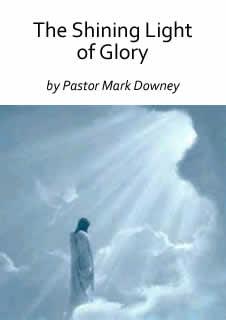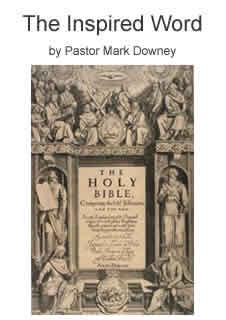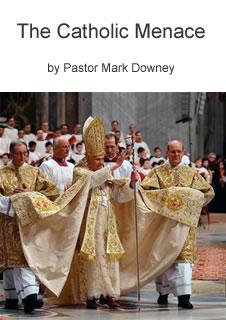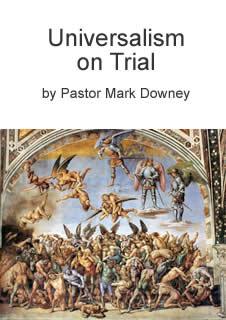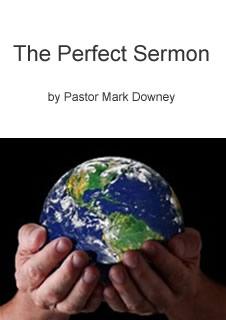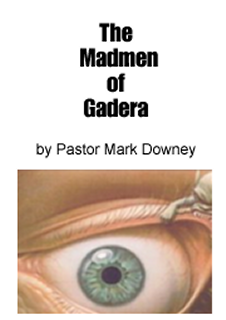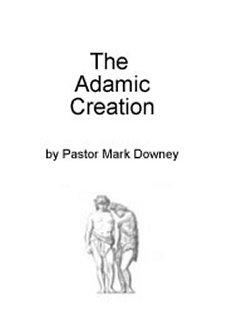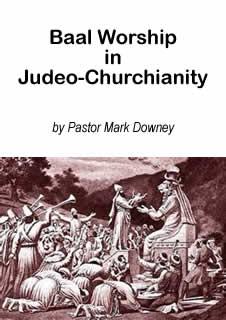Sermon Notes by Pastor Mark Downey
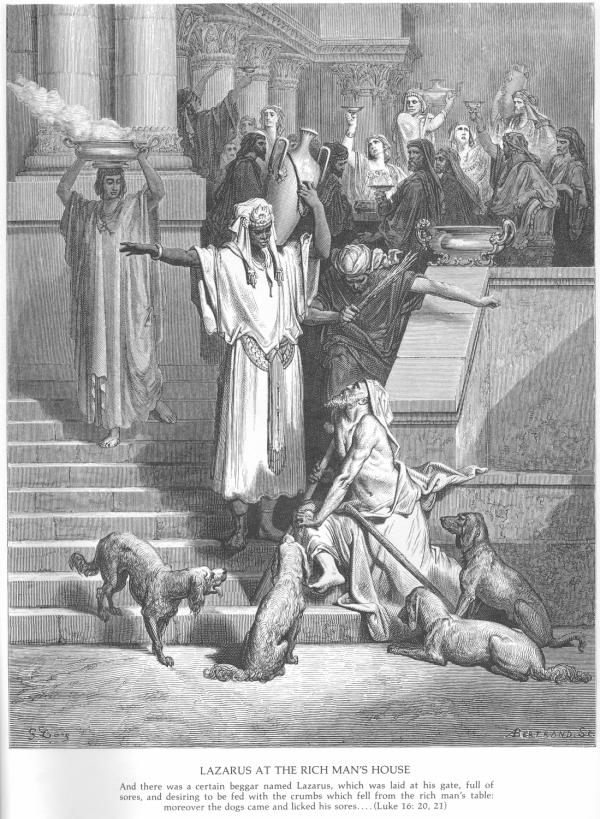 Scripture Reading: Luke 16:24-26 “And calling out he said, Father Abraham, have mercy on me and send Lazarus in order that he may dip the end of his finger in water and cool my tongue, because I am suffering in this fire! But Abraham answered, Child, remember that during your lifetime you received your good things, while Lazarus received bad things. But now he is comforted here, while you are left to suffer. And beside all this, between us and you there is a great gulf fixed; by which those wishing to pass across from here to you are not able, neither from there to us may they cross.”
Scripture Reading: Luke 16:24-26 “And calling out he said, Father Abraham, have mercy on me and send Lazarus in order that he may dip the end of his finger in water and cool my tongue, because I am suffering in this fire! But Abraham answered, Child, remember that during your lifetime you received your good things, while Lazarus received bad things. But now he is comforted here, while you are left to suffer. And beside all this, between us and you there is a great gulf fixed; by which those wishing to pass across from here to you are not able, neither from there to us may they cross.”
The Bible is not just one of the greatest books ever written, it IS the greatest book ever written. We are warned that “If any man shall add unto these things, God shall add unto him the plagues that are written in this book; And if any man shall take away from the words of the book of this prophecy, God shall take away his part out of the book of life, and out of the holy city, and from the things which are written in this book” Rev. 22:18-19. The warning is also found in Deut. 4:2 and 12:32. And yet this is exactly what has happened! The reason for this adulteration is an irrevocable decree; a vast impassable chasm between two entities and we will identify them today and show you how it has been judaized. Why is the abyss impossible to traverse? Will no tears of heartfelt repentance build a bridge for such a repair? We will be investigating the parable of the rich man and Lazarus found in Luke 16:19-31. It has been terribly botched and mangled by churchianity, but we will repair and preserve the original lesson, which can only be understood from a Christian Identity perspective. There is a lot of talk in politics these days about obstructionism, but the real roadblock has been religious. The state church has always been a tool of antichrists to supplant the government of Christ with the government of man. The one world religion of Babylon is in contradistinction to the Kingdom of heaven. And this is what predominates the Christian landscape today, an apostate church run amok. Some even have the audacity to call their church 'The Bridge', which I've mentioned before. This is one bridge that God does not condone, and it should be burned to a crisp. Eventually “all of Israel shall be saved” (Romans 11:26) and none else.
Rather than wasting a lot of time correcting errors and keeping you in suspense about this parable, let me just say what it is not. And after I explain what that is, the former theology will evaporate like a dried up river bed, because without implied consent, it cannot biblically flow with a modicum of common sense. The “great gulf” between the rich man and Lazarus is not a glimpse of what existence in the afterlife is like. The death card and the 'selling of indulgences' is what prompted the Protestant Reformation and yet even they have slipped into being so heavenly minded, that they are of no earthly good, because they exploit Luke to go along with a spiritual charade. Luke would no doubt be upset about such a canard. Scripture itself contradicts the superstitions of heaven and hell. Modern pulpit pimps have isolated the parable as a literal rendition from its original context (as a parable) and used it as a means of fear-mongering. Thus, a denominational affiliation results from a fear of hell, especially the shake 'n bake barbeque pit variety of endless torture, which would nullify the dozens of passages that say “His mercy endureth forever.” This is serious, because we are determining the character of God and the meaning of Scripture. Is God the master torturer with a priesthood of Torquemada's (who just so happened to be the first Grand Inquisitor of Spain and converso, a jew who converted to Roman Catholicism)?
Before we go any further, let's prove that this is a parable and not a literal story as some would have you believe. Is it just a story about economics and the status of the dearly departed, or does it have a deeper racial message? Is it literal or figurative? We can see from the context of chapter 16, that there's already a parable in verses 1-13: the parable of the unjust steward. Jesus was out in the public square and was subjected to critics and mockers: “The Pharisees, who loved money, heard all this and were sneering at Jesus” Luke 16:14. Everything you hear today ridiculing Jesus comes from the descendants of the Pharisees, the jews and their useful idiots. Jesus delivered this parable to His adversaries. He described them as being liars, covetous, hypocrites, full of thievery, self-indulgent, iniquitous, and murderers.
Jesus told His students "Unto you it is given to know the mysteries of the kingdom of God: but to others in parables; that seeing they might not see, and hearing they might not understand" (Luke 8:10). Matthew describes how Jesus spoke to the multitudes in parables: "All these things spake Jesus unto the multitude in parables; and without a parable spake He not unto them:" (Mt. 13:34). So, Jesus was in the habit of speaking in parables to people that were not His disciples. If we are to believe that this story happened in real time and Jesus was merely transcribing an event from which we are to glean a lesson, then it must be supported by other biblical witnesses.
In the narrative, Abraham seems to indicate that the reason why the rich man was suffering in the afterlife was because during his life he had received good things, while Lazarus had received evil things: "you in your lifetime received your good things, and likewise Lazarus evil things: but now he is comforted, and you are tormented." The idea of literally living in poverty and enduring dire circumstances in this life in order to get your lottery mansion in the afterlife is not to be found in Scripture. Not even Job was willingly at peace with his trials and tribulations, although he endured the adversity just as Jesus did. In Luke's Gospel there are six other parables that open with either "A certain man", or "There was a certain man". This would strongly support Luke 16:19-31 being a parable as verse 19 begins, “There was a certain rich man".
As a general rule, one should avoid building a doctrine based on a parable, because they were originally concealing what God didn't want His enemies to know. “It is the glory of God to conceal a thing: but the honor of kings is to search out a matter” Prov. 25:2. How many Christians today would dream of this story being racial in nature? Hardly any, because they've been sidetracked with a false teaching about immediately going to a place of fiery torment after death like the rich man. And this is the only place in the Bible that posits such an idea, perhaps because the myth was already ingrained in people's minds from paganism and served as a teaching tool. Yes, even though II Cor. 5:8 has been tweaked by a verb in casual conversation to say “to be absent from the body is to be present with the Lord”, that still doesn't prove when we will be in His presence. I believe the Bible says all people (Israelites) will be resurrected at the same time at which time they will be rewarded according to their works. “Do not be amazed at this, for the hour is coming when all who are in their graves will hear His voice and come out; those who have done good things, to the resurrection of life, but those who have done wicked things, to the resurrection of judgment” John 5:28-29. Conversely, John 3:13 confirms that you won't find anyone going to heaven, “No one has ever gone into heaven except the One who came from heaven, the Son of Man”. That pops a lot of bubbles! So many bubbles, that they're foaming at the mouth that anyone dare bust their scam of people control.
So how did Jesus handle the Edomite jews, most of whom were the controlling faction of the Pharisees? “All these things spoke Jesus unto the multitude in parables; and without a parable spoke He not unto them; so that it might be fulfilled that having been spoken by the prophet, saying: I will open My mouth in parables; I will utter things hidden from the foundation of the world” Mt. 13:33-34. When He was alone with His disciples, He would elaborate. So do you think these irreverent jerks were still hanging around Christ when He related this narrative about the rich man? Of course they were; they wouldn't miss the opportunity to make sport of the Messiah. But, the humor is lost when you think about why the mysteries of the Kingdom were given to some and not to others; and those who had it were increased and those who didn't, more would be taken away. The Disciples inquired for the Lord to explain.
“And coming forth the students said to Him: “For what reason do You speak in parables to them?” And replying He said to them: “Because to you it is given to know the mysteries of the kingdom of the heavens, but to those it is not given. For he who has, it shall be given to him and he shall have abundance. But he who does not have, even that which he has shall be taken from him! For this reason I speak to them in parables, because seeing they shall not see and hearing they shall not hear nor shall they understand, and the prophesy of Isaiah is fulfilled in them, which says: By hearing you shall hear and by no means should you understand, and looking you shall look and by no means should you see! For the hearts of this people are grown fat, and with the ears they hear with difficulty, and their eyes have closed, that at no time should they see with the eyes, and hear with the ears, and understand in their hearts, that they should repent, and I shall heal them. But blessed are your eyes that they shall see and your ears that they shall hear. For truly I say to you that many prophets and righteous men had desired to see the things which you see and they did not see, and to hear the things which you hear and they did not hear” Mt. 13:10-17 CNT. Christ was speaking of Himself and we are likewise His students today having the advantage of hearing His words and having more than the judaized versions to learn the lesson He was teaching. It was more than a rich man and a guy named Lazarus.
Some will say that it's not fair that we don't all get a fair shake in regards to the Truth. Well, who's fault is that? Truth is something you have to love more than anything, otherwise you are vulnerable to lies, and if you believe a lie, God will send you strong delusion (II Thes. 2:10-11). The rich man is symbolic of those who were heckling Jesus, the crowds of multiculturalism whose hearts were so hardened that they could not comprehend the words of Christ and thus they would never be healed of their mixed blood and religious hypocrisy. They even wrote their own Bible, the talmud, which is a circumvention of Mosaic Law.
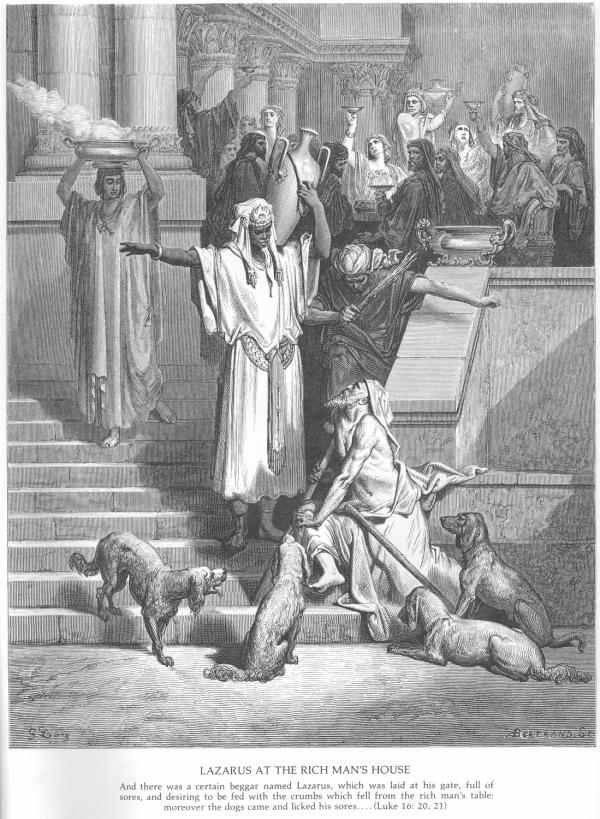 If Christ told them what Christian Identity tells you, they would have killed Him prematurely. And they would love to kill us today for telling you the Truth. Are we in agreement with God or do we minister to serpents? God forbid the latter. We cast not our pearls before swine nor did Jesus. The parable is a surreal picture of two opposite characters separated by a great chasm, almost from planet to an off-planet, and yet they're carrying on a conversation. The graphic illustration at the beginning of our sermon, a woodcut by Gustave Dore'1 titled 'Lazarus at the Rich Man's House' is a little bit more down to earth to depict the reality of Luke 16. If you look closely, the artist rendered the rich man as a negro and the setting is his opulent estate with Lazarus languishing at the bottom of the steps with some dogs. It reminds me of the quirky cartoonist Robert Crumb drawing a contrast between rich jews and street beggars 1 (link provided in the footnote).
If Christ told them what Christian Identity tells you, they would have killed Him prematurely. And they would love to kill us today for telling you the Truth. Are we in agreement with God or do we minister to serpents? God forbid the latter. We cast not our pearls before swine nor did Jesus. The parable is a surreal picture of two opposite characters separated by a great chasm, almost from planet to an off-planet, and yet they're carrying on a conversation. The graphic illustration at the beginning of our sermon, a woodcut by Gustave Dore'1 titled 'Lazarus at the Rich Man's House' is a little bit more down to earth to depict the reality of Luke 16. If you look closely, the artist rendered the rich man as a negro and the setting is his opulent estate with Lazarus languishing at the bottom of the steps with some dogs. It reminds me of the quirky cartoonist Robert Crumb drawing a contrast between rich jews and street beggars 1 (link provided in the footnote).
If Luke 16:19-31 is a true literal story, why aren't the numerous details ever mentioned? Does God just put colorful window dressing in His Word without any meaning? We are told that “Man shall not live by bread alone, but by every word that proceeds from the mouth of God” Mt. 4:4. If it's just about two guys going to heaven or hell, why all the extra language? How could the putative interpretation possibly construe a literal reading? II Tim. 3:16 says, “All scripture is given by inspiration of God and is profitable for doctrine, reproof, correction and instruction in righteousness”. Why? So “that the man of God may be perfect [complete in his divine calling]” (verse 17). So let's read the parable in Luke 16, word for word, underlining the words that have been neglected by Bible scholars and know-it-alls.
“There was a certain rich man who was dressed in purple and fine linen and feasted in luxury every day. And there was a certain beggar named Lazarus, which was laid at his gate, full of sores, and longing to eat the crumbs which fell from the rich man's table. Even the dogs came and licked his sores. And it came to pass that the poor man died, and he was carried away by the angels into the bosom of Abraham. And the rich man also died and was buried. And being in torment in Hades, he looked up and saw Abraham a long way off, with Lazarus at his side. So he called out, father Abraham, have mercy on me, and send Lazarus to dip the tip of his finger in water and cool my tongue, because I am in anguish in this fire. But Abraham replied, Son, remember that in your lifetime you received your good things, while Lazarus received bad things, but now he is comforted here and you are in agony. And besides all this, between us and you a great chasm has been set in place, so that those who want to go from here to you cannot, nor can anyone cross over from there to us. The rich man responded, Then I ask you, father, to send Lazarus back to my father's home. For I have five brothers, so that he may testify to them so that they would not come to this place of torment also. But Abraham replied, They have Moses and the prophets; let your brothers listen to them. Then the rich man said, No, father Abraham, but if someone from the dead goes to them, they will repent. But he said to him, If they do not hear Moses and the Prophets, neither will they be persuaded should one be resurrected from the dead.”
That is our text for this message and if someone wants to take it literally, I shudder to think what else they would take literally. Whenever figures of speech are taken literally, it is a dangerous proposition to add or diminish from God's Word. The parable is just that ... a parable. Please, do you really think that if the non-biblical concepts of heaven and hell were such, that they would be within speaking distance of each other? Or that Abraham comes out of nowhere, as if he was omnipresent throughout the universe, to intervene in the dialogue? The many absurd questions that erupt from a literal spin do not offer any moral or spiritual truths. The purpose of a parable is to teach by illustration. A clear example of a parable is the wheat and tares using symbolic terms to describe something else; the field is the world, tares are antichrists, wheat are the sons of God, the harvest is the end of the age etc. In theological debate, literalists say that in no parable is any individual named. The margin note in a KJV Scofield version says, “Rich men and beggars are common; there is no reason why Jesus may not have had in mind a particular case. In no parable is an individual named”. We know that Scofield was not an honorable man and prostituted himself to the jew/pimp Samuel Untermeyer, directing the judaizing of the KJV for a bargain bribe of 30 pieces of silver.
There is a very good reason for Jesus giving depth to the non-literal parable by naming the protagonist Lazarus. But, it is not the same Lazarus, who was the brother of Martha and Mary. Jesus named this character Lazarus, because in Hebrew it is Eliezer and means “God helps”; or in more simple terms his name means 'the one whom God helps'. In Hebrew culture, it was customary for those with an abundance of resources (rich) to help the poor. The rich man, in this story, had gates on his estate for the purpose of keeping riff-raff out. In fact, helping others was the Law. “There will never cease to be some poor people in the land; therefore, I am commanding you to make sure you open your hand to your fellow Israelites who are needy and poor in your land” Deut. 15:11. You see, the story is not just about the rich, but anybody who does not help their own kind (race). The poor man is in such bad health that he has sores over his body. He doesn't have much going on for him: no food, clothing or shelter. But, he does have one thing: Jesus gives him an important name. We should learn this lesson: if nobody else will help us, God will. And that's the rest of the story. Oh, one other thing; Eliezer was a servant of Abraham and universalists attempt to make him a non-Israelite or “Gentile” so that they can teach the Israel people failing to bring forth the Kingdom and therefore the Covenant blessings were transferred to their Eliezers of the world, who are not heirs of God's Kingdom through blood, but rather through faith in Christ. The truth is: Eliezer was an Israelite and a servant and the Covenants have always been closed to non-Israelites.
Because of the worldliness of judaized Christians, charity does not begin at home, but half way around the world with naked aborigines. Of course, the World Council of Churches doesn't want to know what Lazarus is symbolic of, or even investigate the Hebrew and Greek words Eliezer (el-aw-zawr, #H499, “the name of seven Israelites”) or Lazarus (#G2976, “the name of two Israelites... one imaginary”). The real Lazarus is found in John 11 and 12 who was raised from the dead by Jesus, where there is absolutely no reference or linkage to Luke 16. Some Bible scholars have rendered the Lazarus in Luke to mean “without help” in Thayer's Greek Lexicon, whereas the John 11 Lazarus means “whom God helps”. We'll find out why in a moment. A few theologians who happen to be honest Christians admit, “Attempts to picture the afterlife from it [the parable] should be avoided”2. Could it be that a literal rendering is untenable? It simply poses too many questions to be intelligently answered. Upon fair analysis, the story must be a parable reinforced with plausible exhibits. Let us now proceed to find the keys to unlock each of the symbols in this parable so that the teachings are plainly understood.
Keep in mind that there is dialogue. The rich man and Lazarus are speaking back and forth. Do you really believe a pastime in Heaven is watching the condemned fried up like french fries in perpetuity? Or making occasional wisecracks: how do you like it down there? Is it hot enough for you? Too bad you can't come up here where it's nice and cool. The first verse in the parable must have been a stinging indictment to those who were wearing purple and fine linen. We take colored garments for granted today, but back then a purple fabric, especially a robe, would have been like a $5000 Giorgio Armani suit, very expensive and tailored for the rich. They were probably not amused at Jesus profiling their lifestyles of the political and religious elite. Jerusalem should have been a shining city for the Adamic race paying homage to their Creator, but both houses of Israel and Judah went into bondage, as if their stint in Egypt wasn't enough. At the time of Christ, Jerusalem was a lot like America is today, their manifest destiny was diluted and polluted with aliens who would become the head, and we would become the tail. The elements characterizing the rich man can be none other than the perfect metaphor of jews. The Pharisees would have understood that they were the targets in this parable's extreme rebuke. And it confuses people today who cannot identify the characters correctly.
Well, purple was the color representing a king or royalty. The House of Judah, at the time of Christ, had been usurped by non-Judahites in Judea, who were mongrel Edomites converted to the religion of Israel under the Maccabees 500 years earlier through conquest. Herod and his clan were Edomites and, over time, they amalgamated with Judah, calling themselves Judeans. Later, circa 1750AD, the word Judean was shortened to the slang word 'jew'. They became the ruling class and wore purple and fine linen, befitting only the kings and priests of Israel. They perpetuated a fraud of impersonation all the way up to the present day; they were never true Israelites. They dressed for the part, as commanded by God, but I Thes. 2:15 rightly accuses them “Who both killed the Lord Jesus, and their own prophets, and have persecuted us; and they please not God, and are contrary to all men”. God instructed Moses in Exodus 28 to make holy garments for the priesthood of Aaron (Ex. 39:1). This should be understood in tandem with the Divine Law whereby “Be sure to appoint over you a king the Lord your God chooses. He must be from among your fellow Israelites. Do not place a foreigner over you, one who is not an Israelite” Deut. 17:15 NIV. If Jesus were to point out the abomination of an Obama nation, our Lord would be accused of 'hate speech' and the Pharisees' Southern Poverty Law Center would stick him on their map for special persecution. When Gideon got the spoils of war, he took purple raiment from the kings (Judges 8:26). At the crucifixion, the soldiers clothed Jesus with purple and a crown of thorns mocking His royalty. The rich man also wore linen to embellish his wardrobe of costumes, just as church clowns today dress up in colorful satins and flowing robes. Why? To command respect and control the people. The “armies of heaven [were] dressed in pure white linen” (Rev. 19:14) and the bride of Christ (Israel) prepared herself “in fine linen, clean and white: for the fine linen is the righteousness of saints” (Rev. 19:8).
So let's see if we got this right so far. The rich man (the jewish Pharisees) is supposedly working for God, supposedly administrating God's Law and supposedly custodians of the Temple in Jerusalem. And all the while, they are in a class above all the common people, becoming exceedingly wealthy in their occupations. However, Christ saw their real occupation was sitting in an authority that did not belong to them. They failed to be good stewards and used their wealth for themselves, which is what the parable teaches. It finally became a great curse. The Pharisees thought it was quite normal that plenty and poverty should dwell side by side and had no desire to relieve the poor. Plenty, they thought, was a sign of God's favor, but poverty was a sign of His judgment, which they assumed was a mystery only known by God; and so it wasn’t any of their business. This parable of Jesus, on the other hand, was to show that God was not like that. Material possessions are given by God in trust, to show that He cares for the needy. If one does not behave in a similar godly manner, it is clear that the materialism of the world, rather than God, is his master. Our interpretation of this parable is limited to the cold hard facts that separate the White race from all others. Others will try and convince you that the Almighty Church has replaced God's chosen people as “a chosen generation [race], a royal priesthood, a holy nation, a people for His own; that you should show forth the praises of Him who has called you out of darkness into His marvelous light” I Peter 2:9. Our parable is about a reversal of fortunes, not abolishing the promises of God.
Doesn't this hoax, identity theft (Rev. 2:9, 3:9), remind you of Mystery Babylon where we read, “Woe, woe, the great city, she who was clothed in fine linen and purple and scarlet, and adorned with gold and precious stones and pearls; for in an hour such great riches are made desolate”. I can't help but see a strong parallel from the parable to the fate that awaits those to whom Christ rebuked in Rev. 18:5-8, “For her sins have reached unto heaven, and God hath remembered her iniquities. Repay her the same way she repaid others; pay her back double corresponding to her deeds. In the cup she mixed, mix double the amount for her. How much she has glorified herself, and lived deliciously, so much torment and sorrow give her; for she said in her heart, I sit a queen, and am no widow, and shall see no sorrow. Therefore shall her plagues come in one day, death, and mourning, and famine; and she shall be utterly burned with fire: for strong is the Lord God who judges her”. The jewish umbrella covering the world of mongrelization will be utterly destroyed; Scripture does not teach that the wicked will burn in hellfire for infinity, but rather will be gone forever.
And we're still in Luke 16, verse 19! Besides Jesus being the fashion police, He was also a food critic? Just how does a jew eat? In our story it says he “feasted”. But wait, it says he “feasted in luxury”. But wait there's more, it says “he feasted in luxury every day”. It sounds like he “lived deliciously”. It would be like “hey, honey what's for dinner tonight?” and it would be a five star gourmet restaurant in your home with the meal prepared by a master chef, not just for a birthday party or special occasion, but like for dinner every single night. Maybe it was something like Laura Bush transforming the White House into a kosher kitchen. Israel had special feast days, but they weren't every day. If it was every day, then that would mean every day was a Sabbath, which would defeat its significance. Jesus is telling us that the rich man's appetites are so special as to reach the level of a daily luxury, that he doesn't keep Sabbath to rise above his normal standards, other than the empty and meaningless rituals to maintain the facade. Just as “Messianic jews” try to show themselves to be Christians, the young rich Pharisee in Mark 10:17-22 tried to show himself worthy of future rewards in heaven by claiming sinlessness of the Law. But, Christ knew the level of his piety and told him to sell his possessions, give it to the poor and follow Him and he'll have all he wants. The young jew could not do this and walked away pouting. The poor man would have been happy to eat the scraps from the rich man's table. The rich are covered in luxury, while the poor are covered in sores. The leadership in Judea couldn't figure out health care anymore than modern day Pharisees, who could care less about the nation's health. Instead, it all interlocks into the insurance gambling of Babylon and sorcery; “For thy merchants were the great men of the earth, for by thy sorceries were all nations deceived” Rev. 18:23. Spiritual health demands priorities in life.
"Whoever shuts his ears at the cry of the poor, he also shall cry himself, but shall not be heard" Prov. 21:13. Jesus also said that "Blessed are the merciful; for they shall obtain mercy" Mt. 5:7. Do you see the ironic connection between the rich and poor, between those weeping and gnashing of teeth and those whose tears are wiped away? The new aristocracy in America is not royal births, but royal paychecks and royalties. Its wealth is drunken on the blood of the saints and martyrs of Jesus (Rev. 17:6) and blood-stains the great whore called religion, that masquerades in the clothing of righteousness by way of deception. These wealthy politicians and evangelists dominate and control the very elect. At least these Pharisees and scribes must have felt a bit self-conscious as Jesus described them. But today's hypocrites have no shame and even after caught in lie after lie, they lie more.
Jesus said they sat in Moses' seat, meaning they had both religious and civil authority over White people in Judea. Jesus accused them of all the righteous blood that's been shed upon the earth. It makes you wonder about how many people have died in their jew wars, their poisoned food, their sciences etc in order to get rich? “And in her [Mystery Babylon] was found... all that were slain upon the earth” Rev. 18:24. Some jews will look for scapegoats, while others brag about the death of Christ, saying the Romans did it. However, when the Pharisees conspired to kill Christ, they said “If we let Him thus alone, all men will believe on Him; and the Romans shall come and take away both our place [authority] and nation” John 11:48. Right now, we are living in the first three verses of our parable, because the Zionist Occupational Government has put the White race into captivity. Christ paints a grisly picture of the beggar so incapacitated that dogs come to lick his sickening skin. Even more horrific though, is Christ describing the scribes and Pharisees, “Woe to you! For you are like unmarked graves, and people walk over them without knowing it” Luke 11:44. They live, but are morally dead; the zombies among us.
'The living dead' is now an entertainment genre. Who would produce such an appalling storyline? It would be a shameless jewish Hollywood. The woes continue for this infestation of mammon parasites in Mt. 23:27, “For you are like whitewashed tombs which on the outside appear beautiful, but inside they are full of dead men's bones and all uncleanness”. In other words, Jesus is saying “You're dead, you have nothing but dead works” and in this parable the rich man dies. In jewish movies we sometimes see someone die and yet their so called disembodied spirit or ghost can be seen and heard by some people. I guess if you have a séance or an Ouija board you can tune into the show. Christ is not without humor, using this literary device to mirror the real nature of jews, that is... dead man talking. Even though jews are spiritually dead, people still regard them as being spiritually alive. The rich man died, but he kept right on yacking away, whining and complaining about his poisecution. He had rulership and wealth. That's what jews want, to rule the world where every jew has 2000 goyim slaves. That's their idea of the good life. For 2000 years they have refrained from water, which in the parable is a metaphor for the Word of God that gives life. But no, tnot he jew doesn't want any stinkin' life; they want money. They would rather be actors, forever lamenting the torment of living their holocaust fantasies. And they must forever insist that Christians (the White ones, who are the literal children of Abraham) must help the jews, playing the broken record of Genesis 12:3 that if you curse the jew, then God will curse you. However, since the jew has wormed his way into the leadership of the American church and state, and being blessed with wheelbarrows full of money, our help has only brought a pantheon of satanic gods and idols. Jesus is identifying a certain “people group”, not a certain man, which relates prophetically to the end of the age and the two prongs of Mystery Babylon: talmudic judaism and Roman catholicism.
There are two characters in Luke 16, in Gen. 3:15 and thereafter a conflict, which seems eternal but will eventually come to an end: between Jacob-Israel and Esau-Edom; between the racially pure people of God and the world of mongrelization. We have been sorely judged by God for again whoring after the strange gods of judaism. We have the spiritual sores on the body of Christ to prove that it is us, as a race, whom God has and will chastise. “For whom the Lord loves He chastens, and scourges every son whom He receives” Heb. 12:6. We must be going through “a time of Jacob's trouble” where most of the nations of Israel are under siege and experiencing the golden age of Edom before it collapses. In my earlier research, I had come to a conclusion about these dogs licking the sores of Lazarus. What's that all about? I have some newer theories, but let's look at dogs. In Mt. 15 Jesus identified them in the story of the woman from Canaan who sought help for her sick daughter (v.26). He said it wasn't right to take the bread from the children (of Abraham, Isaac and Jacob) and throw it to the dogs (non-Israelites), because He said earlier in verse 24, “I am sent only to the lost sheep of the house of Israel”. She retorted (v. 27), “That's the truth Lord, but even the dogs eat the crumbs that fall from the table”. Maybe you don't like calling them dogs, but there's no way of getting around the Word referring to non-Whites as dogs. I guess it's cool for negros to call each other “dog” these days. To the far gone liberal mindset way out in left field, they should understand that the woman accepted and knew her place in society and therefore Jesus blessed her and healed her daughter.
It is increasingly becoming self-evident that the jew is agitating the heathens to rage and strike terror in the streets. So I really can't hold my breath expecting non-Whites to help Whites as a whole. When our people came to America, fleeing religious persecution, they were sorely traumatized with their voyages and first colonies. But, the indians in Plymouth Colony did help them survive the harsh winter. And I give a brief history of their experience in 'Giving Thanks'. Not all indians were so passive, as the westward trek was one of brutal savagery. It's really up to the dogs as to whether they are peaceful or hostile; will they lick or bite? They are unpredictable. Not every dog belongs to the NAABP (the National Association for the Advancement of Barking Pets) and not totally antagonized against us by antichrist agitators, who hate it when the coloreds are respectful and thankful for White people. They were somewhat domesticated and trained to admire the South, giving them a better life than Africa and willingly fought during the Civil War against the North. Most dogs prefer Christian government to communist regimes.
The sooner we realize that the Bible is exclusionary, excluding racial aliens from our land, the sooner real salvation will come to Israel. When God kicked Israel out of Samaria and cast them among the heathen, they lost their identity and were called by new names. They were ill-fed, for they no longer had God's Word to eat and their sicknesses from sin were not healed. They were ruled by force and cruelty. All the more reason and need for a Kinsman Redeemer. When Isaiah pictured Israel in her sinful state, he said “From the sole of your foot to the top of your head there is no health, but only wounds and welts and putrefying sores, not cleansed or bandaged or soothed with olive oil” Isaiah 1:6. So too, we see Lazarus having these sores or some kind of hardship or vexation. Try and figure out what our afflictions are today and what dogs licking it means. I tried to find another passage that would help explain. In I Kings 22:38 it's talking about the aftermath of a great battle between Israel and Syria where king Jehoshaphat was killed and his chariot is a bloody mess and is being cleaned up; even the dogs licked up his blood. This was probably a literal dog, but the idea is washing and cleaning up. Although our people are being taxed to death and decadence is making us the tail and our enemies the head, somehow in the scheme of divine providence, there is very little that non-Whites can do for us, but they may make gestures like a dog licking a sore, which venerates or shows reverence to God's chosen people by helping us clean up a mess. As Christians, we better know how to deal with the racial aliens, that is, with authority and compassion, just like you would with a dog.
From an entirely different perspective, there is an implication in ancient Israel that dogs were used to protect property. In Isaiah 56:10, the watchmen were so blind and lazy, that they were compared to sleeping dogs unable to bark. The next verse (11) calls them “greedy dogs [fierce appetites] which can never have enough, and they are shepherds [ministers] that cannot understand; all following their own path and intent on personal gain”. Taking one look at John Hagee, we can see a pattern of indulgences and a kennel of self serving ministers who are only focused on their bowl of kibbles. Maybe it was the rich man's dogs who licked the sores of Lazarus, in which case we might find relief in brave whistle-blowers, leaving the global plantation for a superior morality. There is a common folk belief from ancient times that saliva from dogs has a healing of wounds. The metaphor could be that God placed something unclean in the presence of Judeans and that was the watchful eye of the Romans; not that they were unclean, for they were as White as Israelites; it's just that the culture of Judah did not recognize any other White people than themselves. This was especially hypocritical of the Pharisees whom the majority were mostly mixed blood. But Christ came for the lost sheep, the gentiles or more properly the nations of Israel in dispersion from the Assyrian captivity migrating into Europe at the time of Christ. Even Peter didn't quite get the import of the Roman centurion Cornelius, who was a devout Christian believer and thought to be “unclean”. The point is that we may have White people who have not yet come to know Christ and are still in the dark. But, when they are quickened by the Holy Spirit, they will be able to aid and abet our plight, 'lick our sores' so to speak.
A poor man, who suffers from sores all over his body, is usually too weak to walk or work. The AMA quacks prescribe drugs to alleviate the pain, without much thought about side effects. But the side effects most certainly affect what it is that motivates us to do anything. If we are incapacitated, we're not much different than poor Lazarus. But, with this parable, let us never forget that we are not without help from God. The God of Israel is our help; He will save us. And God does help us, just as He helped Lazarus and Job and David and Noah and Paul and on and on. Next time we will look at what happens to Lazarus in the remaining verses and what happens to the stereotypical Lazarus in our society today. It will be Good News for the body of Christ healing and preparing herself for a clean and healthy life in the Kingdom with Jesus. It will be bad news for the adversaries of God. On that happy note, I pray this lesson was a blessing for you.
Footnotes:
1 Graphic Robert Crumb cartoon showing contrast between rich jews and street beggars: http://www.heretical.com/miscella/rcjoa.html (back to text)
2 The Layman's Bible Commentary, John Knox Press, 1959, Volume 18, page 123 (back to text)








